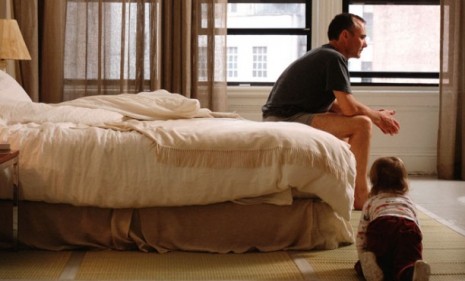The disturbing effect of postpartum depression... on dads
New moms aren't the only ones suffering from postpartum blues. And when men get depressed, some turn violent

A free daily email with the biggest news stories of the day – and the best features from TheWeek.com
You are now subscribed
Your newsletter sign-up was successful
Postpartum depression, traditionally associated with new mothers, afflicts new fathers, too — and in particularly troubling ways. According to a newly published study in the journal Pediatrics, when dads get depressed following childbirth, they sometimes take it out on their children, and violently. Here, a brief guide to the findings:
How big a problem is male postpartum depression?
The study found that 7 percent of the 1,746 new dads they interviewed in 1999-2000 said they'd recently fallen into serious depression. An estimated 25 percent of mothers experience postpartum depression.
The Week
Escape your echo chamber. Get the facts behind the news, plus analysis from multiple perspectives.

Sign up for The Week's Free Newsletters
From our morning news briefing to a weekly Good News Newsletter, get the best of The Week delivered directly to your inbox.
From our morning news briefing to a weekly Good News Newsletter, get the best of The Week delivered directly to your inbox.
How do depressed dads treat their kids?
The "sad dads" were less likely to read to their 1-year-old at least three times a week — only 41 percent did, compared with 58 percent of non-depressed fathers. More disturbingly, 41 percent had hit their babies in the previous month, compared with 13 percent of non-depressed fathers. Children that young "are unlikely to understand the connection between their behavior and subsequent punishment," the authors wrote, and spanking is more likely to injure babies vs. older children.
Wait, aren't these numbers old?
Although the raw data is over a decade old, the study's just been published. And "it's especially relevant today," says Madeline Holler at Babble. Depression in men is strongly tied to unemployment, which is currently at a record high for American males. And the child-rearing issues the study considers are timeless, says Eryn Brown at the Los Angeles Times. "Spanking is associated with negative outcomes for kids; reading is associated with positive ones."
A free daily email with the biggest news stories of the day – and the best features from TheWeek.com
Is there a silver lining?
Fathers are more involved in their children's upbringing, and that includes taking their son or daughter to the doctor's office. With 77 percent of the sad dads visiting their child's doctor, the researchers say there's "an opportunity for pediatric providers to engage depressed fathers," screening them for postpartum blues, or just talking to them about parenting skills.
Sources: TIME, NPR, Babble, Los Angeles Times, Daily Mail
-
 5 calamitous cartoons about the Washington Post layoffs
5 calamitous cartoons about the Washington Post layoffsCartoons Artists take on a new chapter in journalism, democracy in darkness, and more
-
 Political cartoons for February 14
Political cartoons for February 14Cartoons Saturday's political cartoons include a Valentine's grift, Hillary on the hook, and more
-
 Tourangelle-style pork with prunes recipe
Tourangelle-style pork with prunes recipeThe Week Recommends This traditional, rustic dish is a French classic